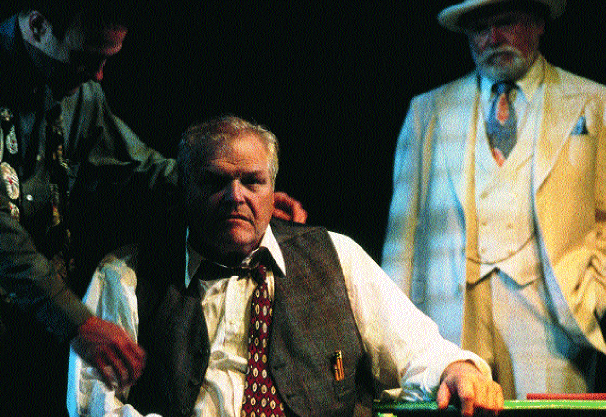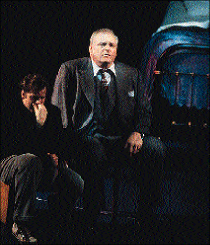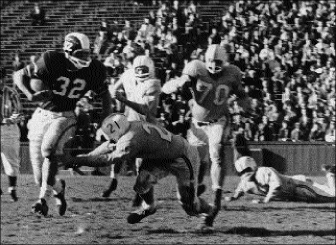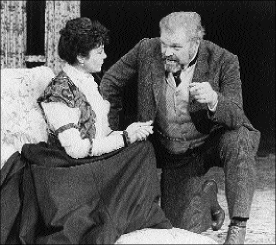Death of a Salesman, Birth of a Star

Dennehy's approach to
portraying Willy Loman was to "just throw myself at the
part."
PHOTO: ERIC Y. EXIT
With his starring role
on
Broadway as Willy Loman,
Brian Dennehy '60
is finally getting the
attention he deserves
By Shira J. Boss '93
| A
wonderful thing is happening to Brian
Dennehy '60, and attention is being paid. Since breaking into
Hollywood at age 37, the blue-eyed hulk of an actor has become
almost omnipresent in character roles on TV specials and
mini-series. For two decades he also has been a regular on the
silver screen: as the sheriff in First Blood, the lead alien
in Cocoon, the cunning lawyer in Presumed Innocent
(not Harrison Ford, the other one). But he always has been a sort
of second-tier star: audiences know his face and figure (6'3",
250+) and critics generally praise his performance, although his
name is rarely featured on cinema marquees and few rush to the
video store looking for his latest release.
But now his role as a non-star is changing. On February 10, the curtain went up on Broadway's 50th anniversary run of Arthur Miller's Death of a Salesman, with Brian Dennehy very much in the limelight as Willy Loman. Chicago audiences already have embraced Dennehy for his past performances in The Iceman Cometh, Galileo and A Touch of the Poet. But as Willy Loman, Dennehy has become a Broadway star, and everyone is taking notice. He's a leading contender for the Tony Award. The box office is crammed. The now gray-haired 59-year-old had to stop giving interviews after a month of draining three-hour performances and non-stop press appointments put him in the hospital briefly for exhaustion. "The play has changed the buzz on Brian Dennehy," says producer Larry Brezner, a longtime friend. "He has always been thought of as a fine actor, but kind of a type. Now what I'm hearing from people in the industry is that they see Dennehy as an actor who's capable of a lot more than they realized. I have no doubt his choices will increase now." Arthur Miller says he originally envisioned Willy Loman as a small man. But the first Willy on Broadway was played by the solid Lee Cobb, and he was followed in 1975 by robust George C. Scott. Present-day audiences probably remember Loman best as portrayed by Dustin Hoffman in 1984 on Broadway and the following year on CBS. As the fourth actor to play the role on Broadway, Dennehy returns to the big & tall Loman legacy. "People say, 'You do it so differently than Dustin Hoffman,'" Dennehy told a sardine-like standing room only audience at a Barnes & Noble event starring himself and Miller. "Well, I'd like to play the role as a 5'4", 140-pound man, but I haven't figured out how. That good an actor I'm not." Dennehy's Loman is even more tragic for being an energetic, reassuringly large figure.
Dennehy achieves "a grand emotional expansiveness that matches his monumental physique," according to The New York Times. PHOTO: ERIC Y. EXIT Director Robert Falls, who has collaborated with Dennehy on a number of productions, says that when he initially thought of Dennehy for the starring role, he considered him "too vital" to play Loman. Then, in the fall of 1997, the two were walking to dinner and Dennehy, with knee problems, was hobbling along. From that moment, Falls knew he would make a believable beleaguered salesman. By February, Dennehy says he was telling Falls that he wasn't working, didn't have any money, and was facing a knee operation. "Willy Loman's going to be broke, and crippled, too?" Falls said. "That's perfect!" Miller, who never saw the production in Chicago, suggested British actor Warren Mitchell for a Broadway run. But when Falls told him he was committed to Dennehy, he says the playwright responded, "Brian Dennehy? That's a hell of a good idea!" It was only Dennehy himself who had doubts, which he expressed privately to Falls when the show was in Chicago. "If it wasn't for me, this production would be on Broadway in a minute," he suggested. "I'm not Dustin Hoffman. I'm not George Scott. Am I going to sell any tickets?" The answer, according to the box office at the Eugene O'Neill Theater on 49th Street, is a resounding "Yes." Only this season's Blue Room, with 16 seconds of a naked Nicole Kidman, created an equal initial buzz, and neither Brian Dennehy nor any clothed male could compete with that. Dennehy's Loman is even more tragic for being such an energetic, reassuringly large figure. His broad frame, booming voice and sparkling eyes raise hopes that Loman will somehow pull himself together; they make the scenes of him being thrown out of his boss's office or planting seeds by moonlight especially pathetic. "What this actor goes for is close to an everyman quality, with a grand emotional expansiveness that matches his monumental physique," wrote Ben Brantley in his review of the play for The New York Times. "Yet these emotions ring so unerringly true that Mr. Dennehy seems to kidnap you by force, trapping you inside Willy's psyche." Dennehy tells of hearing audience members not only sniffling but breaking down during any of several emotional scenes. "During previews, one woman in the third row just completely lost it, she was almost hysterical," he says. "Her husband was telling her to pull it together, saying, 'Honey...please!' Even we on stage were affected. Something had happened at that kitchen table that had obviously happened to her." It is the genius of the play that readers and audiences identify with the American Dream gone awry and can be disturbed for days afterwards. "It's rare at the end of the play that we don't have people sobbing, not because of what they've seen on stage but what they've seen in their own lives," Dennehy says. "It's the tension, the accuracy of the emotions in that family that bounce off people every night." Even Miller is still making discoveries about the character he created a half-century ago. "Everyone in the play loves Willy except Willy," he told the Barnes & Noble audience. "I didn't realize it until I saw the rehearsals in New York." During the play we witness Loman as father, husband, brother, lover, neighbor, and, of course, salesman. "I've always been an actor who wants to read and think and analyze," Dennehy says. "But I realized I had to stop rationalizing the part and just throw myself at the part, because that's what Willy does. He's an instinctive person who believes in a few things and nothing else. "So a cautionary note to most actors: stop thinking. Of course, most actors don't need to be told to stop thinking."
Dennehy (No. 70) played with the
Lions football team, but what he really wanted to do was join
Columbia Players. As the latter remark indicates, Dennehy hardly is in awe of tinseltown and those who participate in its industry. "He's unique in Hollywood terms -- he refuses to play games and always says what's on his mind," Brezner says. But he does take the movie roles when they are offered, especially if they will challenge him or the audiences. When he saw the script for Presumed Innocent, he actively pursued the role because "it's a movie where people have to think." A look at Dennehy's reading list reveals just how intellectually engaged he is. He devours history and biographies and is a huge fan of John Updike and Cormac McCarthy, after whom he named his son. His regular diet also includes American Spectator, The Nation, National Review and Commentary. He is currently re-reading Saul Bellow's works and biographies of Washington and Jefferson. Scattered around his New York hotel room, in addition to Bellow's The Dean's December and Humboldt's Gift, are Michael Cunningham's The Hours, Elmore Leonard's Be Cool, William Trevor's Death in Summer, a book of Philip Larkin's poems, a collection of essays by Eric Breindel and a biography of Billy Wilder. That the late-blooming actor is a hit on Broadway is testament to his own Deepak Chopra-like philosophy of success being doing what you love. "To me, acting is working on stage," he says. "If you're lucky, you do some TV and film and make some money, which is something I never expected. But when you make tons of money, suddenly you're doing it for different reasons." "One thing I've been able to pass along to my children -- all of them -- is a great passion for being who they are and doing what they want to do," he says. "That I take credit for and am proud of. Too few people have it." Dennehy himself was not taught that growing up. If wanting to be an actor seemed natural to him, pursuing it as a profession seemed impossible. His working class, Irish Catholic family, raising him in Brooklyn and then from age 12 in Mineola, Long Island, did not understand the notion. "Anyone raised in a first or second generation immigrant family knows that you are expected to advance the ball down the field," Dennehy says. "Acting didn't qualify in any way." His father, a long-time writer and editor for the Associated Press, wanted him to be a lawyer, and saw his son getting into Columbia as entrée into that world. But Dennehy had other ideas, even while he was on campus. "Most of my time was spent raising hell," he says. "Columbia was one of many missed opportunities in my life." He played varsity football as an offensive lineman ("I had to give Columbia something," he says. "We were at the bottom of the league!"), but what he really wanted to do was join the Columbia Players. They would have none of it.B "In those days, the Players had an artistic definition of themselves which didn't allow a football player to be active. I remember going up there a few times and distinctly feeling unwelcome," he says. Barnard was more amenable, and he performed in a musical there. Struggling academically, Dennehy left Columbia after his junior year and joined the Marines. He met his first wife on Long Island and they quickly had two children. With the Marines he was stationed in the United States, Korea, and Japan. (It has been widely reported that he was wounded during two tours in Vietnam, but in fact he was never sent there.) After military service, he came back to campus and, following two more years of study and the birth of one more daughter, graduated with the class of '65. Like most graduates of the day, he was enchanted by professors such as Mark Van Doren, James Shenton, Zbigniew Brzezinski, and Quentin Anderson. Unlike other classmates, however, he went from campus to blue-collar jobs -- cab driver, trucker, bartender -- that supported his family and his regional theater acting habit. He later called working those jobs the best preparation he could have had for being an actor because he knew the mindset, the behavior and the lingo first-hand, without having to do fieldwork when a role came his way. As close as Dennehy got to Willy Loman's job was working as a stockbroker. He says he hated it, he wasn't good at it, and that it eventually motivated him to dedicate himself to acting. "I was sitting in the bullpen at Merrill Lynch down at Liberty Plaza and 30 guys got off the elevator with their attaché cases and headed for their desks," he remembers. "I thought to myself, 'I've got to get out of here.' And I did. "Eventually, I was an overnight success -- after 15 years." "Brian
Dennehy? That's a hell of a good idea." -- Arthur
Miller Dennehy with Natasha Perry in
Chekhov's The Cherry Orchard. Dennehy is one of the few actors who has been able to move back and forth among television, cinema and the stage. He has an astute business sense about acting and has even -- for the right price -- done a commercial for heartburn medicine. "Whenever the phone rings," he once said, "I'm prepared to listen." The critics usually praise his performances in any medium, although he has acted in some doozies. "Whatever could possess Brian Dennehy to make this movie? Gambling debts? Alimony? Workaholism?" one critic wrote about the 1982 film Gladiator, in which Dennehy played a retired boxer. Dennehy fits not just the standard Irish cop roles but also more complex, sometimes creepy characters. He played serial murderer John Wayne Gacy in the 1991 TV movie To Catch a Killer, and Teamster boss Jackie Presser for an HBO special. "I try to play villains as if they're good guys and good guys as if they're villains," he said in 1992, when he finished filming Burden of Proof. Insiders are respectful, even admiring, of the actor's range. "You really have to be another actor to see just how good Brian Dennehy is," actor James Woods said when the two co-starred in the 1987 movie Best Seller. Larry Brezner, the producer, first saw him in the movie 10, in which Dennehy played a bartender who gave Dudley Moore advice. "It's proof positive when you can do 30 seconds on screen and be so effective that it's really memorable," Brezner says. "I say to people, 'You know that guy in 10?' And they say 'Yeah, yeah -- that guy was great!'" "Whatever he's doing, I'm interested," television critic Bob Wisehart wrote in 1994 when Dennehy starred in the short-lived ABC series Birdland. "The burly actor plays good guys and bad guys with equal aplomb and vitality. He's worth watching even in a bad movie, and he's made several." When he was focusing on television, mostly in mini-series and made-for-TV movies, he defended the work as being more substantive than what was being made in Hollywood. Although completely unpretentious, Dennehy is cerebral about his work and has scoffed at what he calls "pure diversion." For Dennehy, an audience wants and should have an underlying issue or interest that goes beyond mere entertainment. In the early '90s he starred in, co-wrote and directed a series of dramas based on real-life Chicago detective Jack Reed. NBC balked when the fifth episode opened with three minutes in Russian, but Dennehy told them: "You know what? Your audience is smarter than that. If you do something provocative and stimulating, they'll stick with you." While he looks for challenging roles, it is his willingness to play across the board that has kept Dennehy one of the busiest actors around in the past two decades. A steady stream of films has supplemented his frequent television appearances, and led to charges of overexposure. He doesn't have much respect for a vapid Hollywood environment; he does, however, have enough ego and business sense to snap up a reported $1 million-$2 million for participating in their movies. His talent has been recognized, and he has done some memorable parts, in Silverado, F/X, Belly of an Architect and 10 in addition to Cocoon and Presumed Innocent. But he has never quite reached the level of film star, and many posit that he would have gone a lot further in Hollywood had the likes of Gene Hackman, Robert Duvall, and Jason Robards not been around. Especially Hackman, whom Dennehy admires but who has been identified as a competitor who has beaten Dennehy to many parts. Dennehy jokes that "movie scripts have so many fingerprints on them by the time they get to me that I feel uncomfortable." Despite not being pin-up material, Dennehy has a sex appeal that has gone unexploited. He would like the chance to play romantic roles, but says his husky physique precludes that, as far as Hollywood is concerned. Perhaps casting directors should run more female focus groups: one twentysomething blonde leaving the theater after seeing Dennehy as Willy Loman told her friend, "All I could think of is, 'I must have him.'" She has most likely missed her chance. Dennehy says indulging in women and drink was a lifestyle from an earlier era in his life, when he was a self-described "functional alcoholic." "I have an obsessive personality. With one substance or another I can go from stage A to stage F in addiction in about a week and a half," he told Life magazine in 1990. At age 49 he was describing for The New York Times that he doesn't give "your typical L.A. parties, where everyone sips a little wine and goes home at 10 o'clock. At my parties, the sheriff's department comes three or four times a night." To celebrate St. Patrick's Day, he and his friends used to rent a mobile home or limo to chauffeur them around to the bars. "Invariably we would wind up with the driver drunk and someone else having to drive," he says. "But that was in my callow youth, which is long gone." He used to live in Santa Fe, N.M., far from the Los Angeles that made him itchy, before he and Jennifer moved in 1996 to a farm in what Dennehy stresses is "the unfashionable part" of Connecticut. "My neighbors have refrigerators on their porches, wear camouflage and drive pick-ups. There's not an espresso machine within 50 miles, and I wouldn't have it any other way. Big Bird is the other celebrity in the area, and as far as I'm concerned he's No. 1." Dennehy's success in Death of a Salesman, rather than contributing to an actor's ego, has given him a sense of personal accomplishment and fulfilled a mission of doing what he loves best. "The great thing about doing this play and what's happened to me in the last six months," he says, "is that I've found something that was lost: a sense of who I am, and what I'm about, and why I got into this 30 years ago. Why I drove a cab, why I drove a truck, why I worked so hard to get into this profession. It's very easy to lose it along the way, and I didn't realize how much I needed it until I got it back."
|


